The Tremors
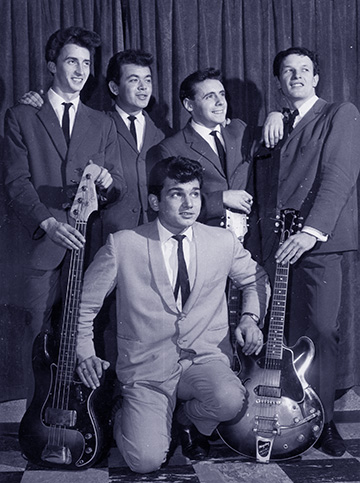
ALBRIGHTON - WOLVERHAMPTON
Updated September 2016
Mick Mercer guitar, bass, vocal
Mick Blythe lead guitar, vocal
Clive Mountford drums
Lawrence Smith guitar, vocal
Martin Logan bass guitar
Brian Saxby washboard
Andy McLachlan bass guitar, piano, vocal
Les Parker vocal, guitar, banjo, bass guitar
Mac Bailey guitar
Cliff Rogers vocal
Alan Baker vocal
Johnny Gould vocal
Roy Jeavons organ, vocal
Johnny O'Hara vocal
Beryl Hamilton vocal
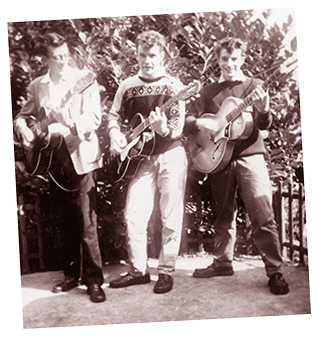
A significant influence in the development of West Midlands pop music is the impact of 'Skiffle' during the 1950s, long before the Rolling Stones, The Beatles, Cliff and The Shadows, or even Elvis. Home-made Skiffle music was the 'punk rock' of its day although this raw, energetic style of playing owed more to the music than fashion. Popularised by singer Lonnie Donegan, his skiffle anthem 'Rock Island Line' issued in 1956 inspired countless teenagers to take up the guitar.
Local rock music historian and guitarist Brian Nicholls of 60s group Varsity Rag examines the impact of Skiffle as told through the experiences of Mick Blythe and Les Parker who went on to form one of the earliest rock 'n' roll bands in the Wolverhampton area called 'The Tremors'. Brian's story of The Tremors is as follows:
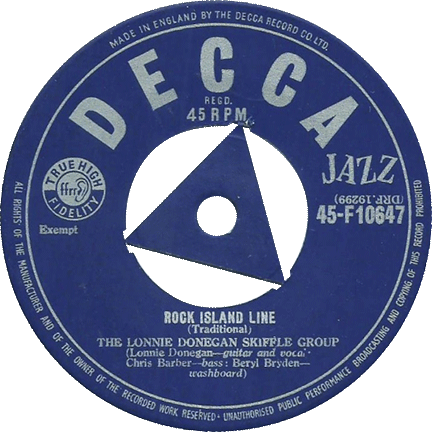
1956 was a great year for skiffle because Lonnie Donegan had secured a top ten hit on both sides of the Atlantic with 'Rock Island Line'. The song stayed in the charts for six months and sold millions in the process. It had been recorded two years earlier when Donegan was just a banjoist with The Chris Barber Jazz Band and did a sort of novelty spot as part of Barber's stage show.
Rock Island Line, an American folk/blues song written by Leadbelly, was recorded with Donegan singing and playing an acoustic guitar, Chris Barber on double bass and Beryl Bryden playing a washboard. Decca released the song in 1956 under 'Lonnie Donegan and his Skiffle Group' because of the amount of requests from radio listeners. The success of this record resulted in skiffle "going viral" in Great Britain with an unprecedented boom in acoustic guitar sales to feed the appetite of tens of thousands of provincial skiffle groups across the land. It seemed like everyone was at it!
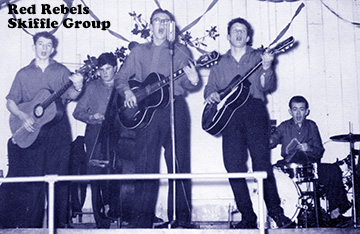
In Albrighton near Wolverhampton, twenty three year old Mick Mercer, who had already played classical guitar and Spanish folk music for four years, promptly "jumped ship" and set about forming his very own group. By the summer of 1957, "The Red Rebels Skiffle Group" was formed, rehearsed and ready to debut with their first booking at Albrighton Working Men's Club- resplendent in their bright red shirts and, all acoustic instruments with not an amplifier in sight save for the public address system used primarily for calling out the bingo numbers on a Saturday night. However, the lads generated sufficient volume for the club secretary to approach the stage yelling; TURN IT DOWN, TURN IT DOWN!"
REBELS WITH A CAUSE

Part-time youth leader and singer/guitarist Mick Mercer had put together four enthusiastic lads, all between sixteen and seventeen but, initially the two guitarists could not play so Mick had to teach them the rudimentary skiffle chords of A, D and E so they could play Rock Island Line and literally hundreds of other similar songs. In addition to Mick, the line-up of The Red Rebels was Mick "Bebop" Blythe (guitar), Lawrence "Biffo" Smith (guitar), Martin "Kong" Logan (tea chest bass) and Clive "Suggy" Mountford (drums).
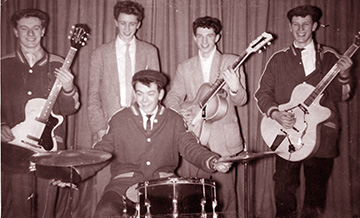
They must have gone down well because Albrighton WMC offered them regular Saturday work and also, their 'Christmas Dance'. As word began to spread, Bilbrook Youth Club got in touch for their own Christmas Dance and then The Palace Ballroom in Albrighton booked them at its regular Monday 'Skiffle and Coffee' nights and also their New year's Eve dance.
The Dorchester in Temple Street Wolverhampton also snapped them up as Wolverhampton's acclaimed 'Top Teenage Hot Spot' and then followed youth clubs in Wednesbury as well as numerous weekend and holiday fetes, festivals and carnivals. Skiffle may not have lasted long but, its impact was enormous.
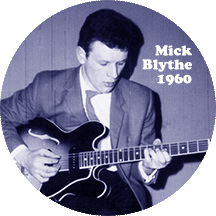
Mick Blythe; "We didn't have an agent nor indeed needed one. Clive took on the role of self-appointed 'business manager' and made an excellent job of it. He worked at Beattie's in Wolverhampton and so worked in a management environment where once he persuaded the store to book us for a big Christmas party. He had a very professional and persuasive way of dealing with bookers and he was also a natural problem solver. On one notable occasion when he had forgotten his drumsticks he improvised with a knife and fork - unless you had looked, you would never have noticed the difference."
FROM SKIFFLE TO ROCK
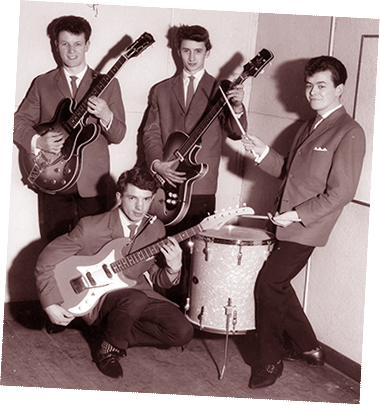
Eventually, the Rebels recognised the emergence and unstoppable force of rock 'n' roll and so began to split their stage act with Mick Mercer singing the purist skiffle songs and Mick Blythe and Biffo Smith the rock 'n' roll. Not happy with this emerging trend, Mick Mercer left the Rebels and Biffo Smith and Mick Blythe took over the vocals and in December 1958 changed the group name and Biffo's stage name to "Hurricane Smith" and The Tremors. They also changed from being a purely acoustic group to all electric.
They were also smitten with an American LP called The Chirping Crickets featuring a then unknown Buddy Holly along with the group holding two electric guitars - a Gibson and a Fender. However, there was a British embargo on American guitars but, thankfully it was lifted in 1960.
UNDER THE INFLUENCE
Mick Blythe; "I drew my inspiration initially from Duke Ellington, Frank Sinatra, Doris Day and Les Paul and Mary Ford. However, I went to see Bill Haley and his Comets in Birmingham in 1957 and was inspired by the lead guitarist Franny Beecher. I then started to study other guitarists like Cliff Gallup in Gene Vincent and The Bluecaps and Scotty Moore, guitarist with the Bill Black Combo who backed Elvis Presley, Denny Wright with Lonnie Donegan and, of course, Buddy Holly.
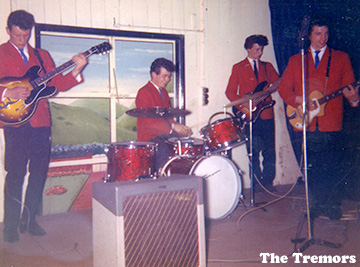
I used to sit for hours and hours learning their guitar parts from the records but, I discovered all the American rockers through listening to Radio Luxembourg as there was nothing on the BBC. Towards the mid sixties I discovered American jazz guitarist Wes Montgomery whose whole approach to soloing had an influence."
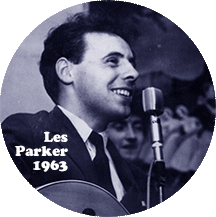
Les Parker; "My musical influences were folk, jazz, country and skiffle and Lonnie Donegan was a major inspiration. There was also Hank Williams, Chris Barber, Monty Sunshine jazz band and of course, Bill Black who played double bass slap style. Music came naturally to me and I can pick things up easily and busk along to anything. I play double bass, slap bass, electric bass, guitar and banjo. I loved all the folk songs we had to sing at school such as, The Ash Grove, All Through The Night, John Peel, The Lincolnshire Poacher and Barbara Allen."
A WINNING STREAK
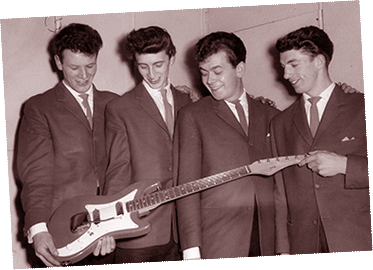
The Tremors entered a skiffle contest on 8th May, 1958 in Wellington in front of 200 people and won first prize. On Saturday, 22nd April, 1961 they competed against seventeen other groups in a prestigious national 'Rock Group Contest' at St. Pancras Town Hall in London and again came first, winning a Vox electric guitar and an opportunity to record their two winning songs. The competition was sponsored by international music magazine BMG (Banjo, Mandolin and Guitar) and they appeared as cover artists on the magazine. These lads were seriously good!
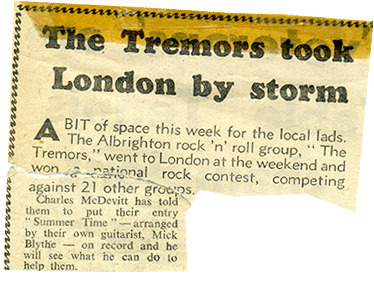
Mick Blythe; "The reason we won the competition was because all the other groups predictably played current chart stuff and The Shadows' material - there must have been three of them who played 'FBI' whereas, we chose two jazz standards, 'Summertime' and 'Blue Moon' which delighted the judges two of which were Chas McDevitt and Shirley Douglas of The Chas Mc Devitt Skiffle Group."
RINGING THE CHANGES
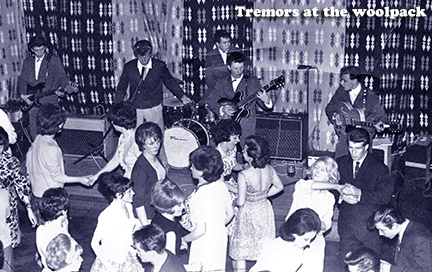
Like all groups, personnel changes were rife in The Tremors. Mick Blythe; "In one form or another, The Tremors survived eight years during which we had ten singers come and go but, the nucleus of the group between 1960 and 1964 comprised of myself (lead guitar, vocals), Les Parker (rhythm guitar, vocals), Clive Mountford (drums) and Andy McLachlan (bass, vocals and piano). However, every single person who joined us along the way brought something positive to the group. We played top venues throughout the Black Country and London and supported The Four Seasons, The Spotnicks and Gerry and The Pacemakers"
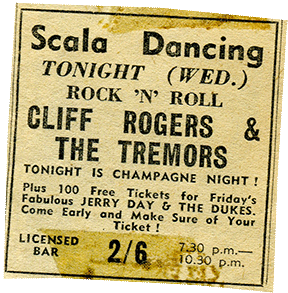
Les Parker; "I was delighted when Mick Blythe knocked on my door and asked me to join The Tremors. I'd always admired the group who were driven by bass and drums so were a great force and very, very tight especially Mick who was meticulous about sound quality and accuracy. I was required to purchase the then state of the art amplifier, a Vox AC30, as used by The Shadows, Beatles and Searchers and just about anyone else in the limelight."
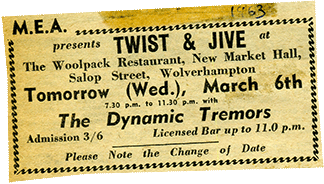
BrumBeat Visitors will be interested to note that Les Parker joined The Tremors from Wolverhampton's Black Diamonds - themselves once a skiffle group who later went on to become The Californians. One-time singer with The Tremors, Johnny O'Hara, came from Coseley's Strangers but, went on to join The Californians.
Guitarist Mac Bailey once of The Tommy Burton Band joined Fable and long-time Tremor Andy McLachlin went on to create Domino Sound recording studio in Albrighton whereat the majority of midlands groups cut discs at some point in their lives including The 'N Betweens and Steve Brett and The Mavericks to name but two. Mick Blythe left to join Walsall's Redcaps, Les Parker the Pete Taylor Sound and Clive Mountford, Zuider Zee.
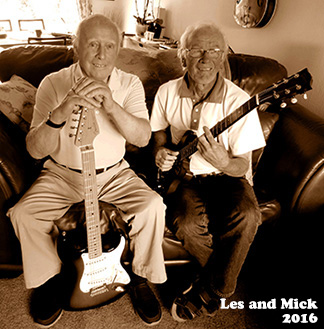
The Tremors had a long and enjoyable innings and achieved so much personal satisfaction on their journey. They gave immense pleasure to all who saw them and danced to their music. They earned the respect of their peers and could prop up the bar with household names they supported along the way.
Their story of Skiffle to Rock is duplicated thousands of times across Britain and whilst The Red Rebels Skiffle Group and then The Tremors were doing all of this, The Railroaders Skiffle Group on Tyneside were morphing into The Shadows and The Quarrymen Skiffle Group on Merseyside, The Beatles. The Tremors were a worthy and able piece of that musical jigsaw.
This account of Skiffle and The Tremors was written by Brian W. Nicholls (formerly of Varsity Rag). Special thanks to Les Parker and Mick Blythe for their generosity in the loan of archive material and recordings.
Copyright © 2016 Brian Nicholls